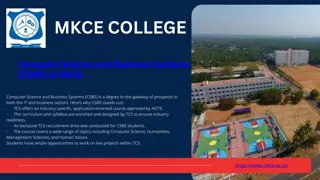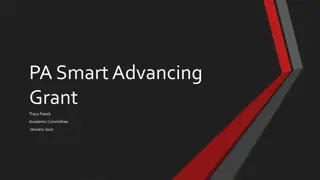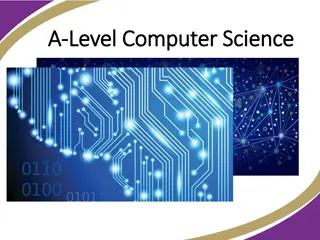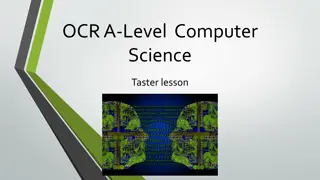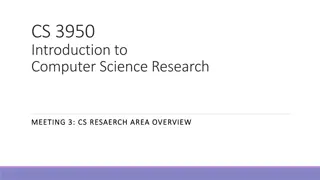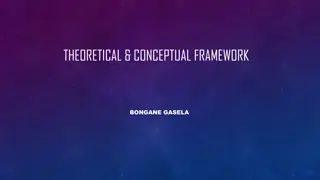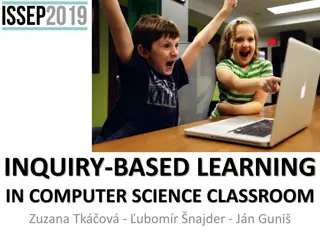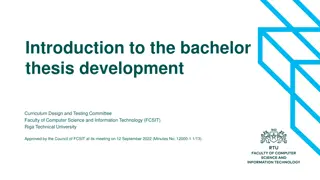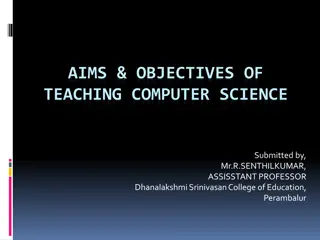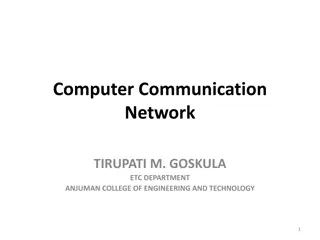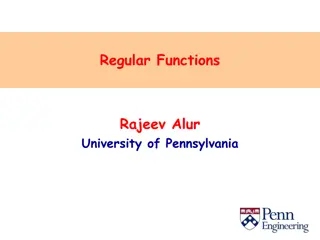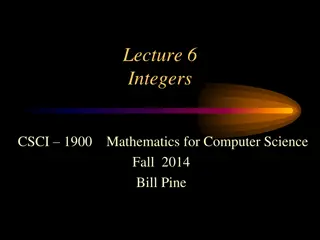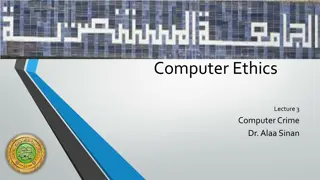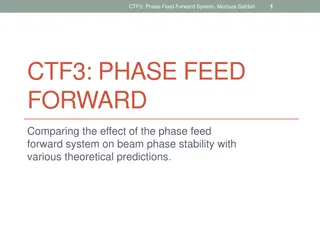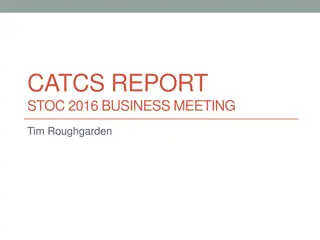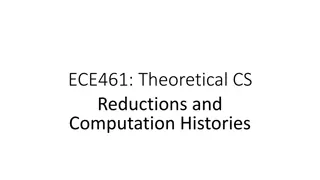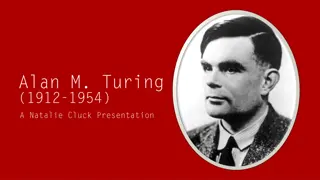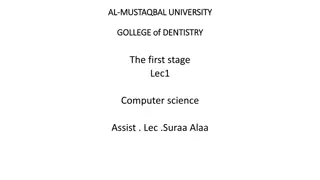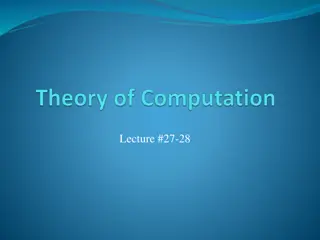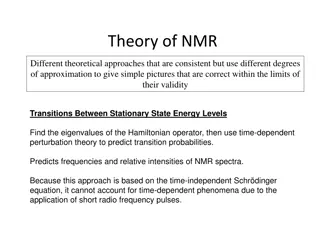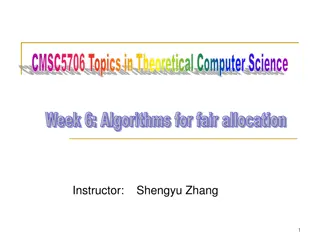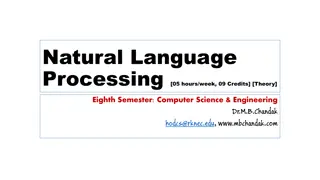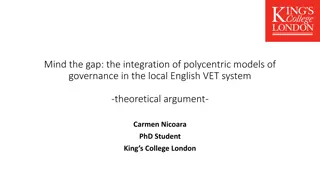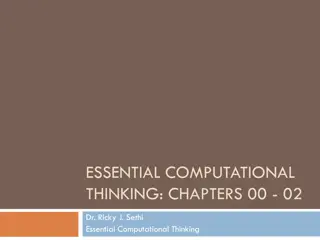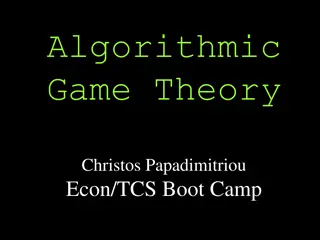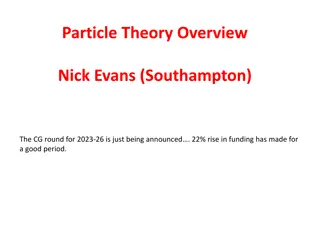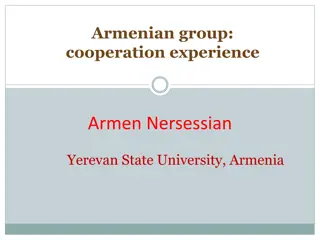Role of Computer Science in Modern Society
Computer science plays a crucial role in various sectors of life, from business to education. It encompasses a wide range of disciplines, including software development, hardware engineering, system designing, networking, and database administration. The field's scope extends beyond traditional comp
1 views • 20 slides
Understanding Computer Organization and Architecture
A computer system is a programmable digital electronics device that processes data as per program instructions to provide meaningful output. It comprises hardware and software components, with hardware being the physical parts and software essential for driving the hardware. Computer organization fo
14 views • 71 slides
Insights into Theoretical English Grammar
The theoretical English grammar delves into the subject matter of grammar, including systemic conceptions, grammatical forms, categories, paradigms, and morphological means. It discusses the constituent parts of language – phonology, lexicology, and grammar. The grammatical structure covers morpho
7 views • 26 slides
Introduction to Components of a Computer System in Home Science
Explore the components of a computer system in Home Science, including input devices like the keyboard, alphanumeric keypads, cursor movement keys, and special keys such as Enter, Ctrl, Esc, and more. Learn about the internal structure of a computer system and the key functions of CPU, ALU, memory,
9 views • 12 slides
B.Sc (Arts) Courses and Colleges List for Science Students
If you\u2019re a 12th-grade student exploring undergraduate options in the B.sc science stream, consider the following list of recommended courses and colleges\nThe list of courses and colleges for the Science stream:\n1. B.sc (CS)\nThe BSc Computer Science, or BSc CS, is a 3-year undergraduate prog
9 views • 5 slides
List of preferred M.sc courses and colleges in Tamil Nadu
The students who are seeking to do their Post Graduate programs in M.sc after the undergraduate field of Science stream, here there are some preferred PG arts courses and college\nM.Sc CS\nThe M.Sc. in Computer Science is a two-year postgraduate program aimed at developing professionals with essenti
9 views • 5 slides
Computer Science and Business Systems (CSBS) at MKCE
Computer Science and Business Systems (CSBS) at MKCE\nWelcome to the world of Computer Science and Business Systems (CSBS) at M.Kumarasamy College of Engineering (MKCE), an avant-garde and industry-specific program designed to forge the future leaders of technology and business. Moreover, if you\u20
0 views • 2 slides
Advancing Computer Science and STEM Education in Rural Lancaster County
PA Smart Grants, spearheaded by Governor Tom Wolf, are driving the advancement of computer science and STEM education in Pennsylvania. Manheim Central, along with other institutions, has secured grants to expand access to these crucial fields. Initiatives range from early childhood STEM programs to
2 views • 9 slides
Understanding Computer Architecture and Organization
Computer architecture and organization are fundamental aspects of computing systems. Computer architecture focuses on the functional design and implementation of various computer parts, while computer organization deals with how operational attributes come together to realize the architectural speci
3 views • 40 slides
Explore the World of Computer Science and Careers in Technology
Computer science is more than just computers and programming; it encompasses theoretical concepts and practical techniques for software and hardware development. Discover the significance of computers in our lives, the diverse career opportunities in the tech industry, and educational pathways in th
1 views • 17 slides
Dive into OCR A-Level Computer Science Taster Lesson
Explore the world of OCR A-Level Computer Science through a taster lesson covering fundamental principles, computational thinking, problem-solving, and more. Unveil the creative and practical aspects of computer science, offering a blend of theory and real-world applications. Delve into computer sys
1 views • 20 slides
Computer Science Department Information and Courses Offered
The Computer Science Department provides information on courses offered for GCSE or BTEC qualifications, specifically focusing on the AQA GCSE in Computer Science. The course equips students with valuable thinking and programming skills essential in the modern workplace, covering key concepts and pr
3 views • 7 slides
Overview of Research Areas in Computer Science
Explore various research areas in Computer Science including Algorithms & theory, Artificial intelligence, Data science, Games, Machine learning, Robotics, and more. Understand the diversity and importance of different domains within the field of Computer Science research.
0 views • 4 slides
Understanding Theoretical and Conceptual Frameworks in Research
The theoretical and conceptual frameworks in research play vital roles by grounding studies in theoretical constructs, enhancing rigor and empiricism, and guiding the research process. The theoretical framework provides a blueprint based on existing theories, guiding researchers in developing their
0 views • 12 slides
**Exploring Inquiry-Based Learning in Computer Science Education**
Inquiry-based learning (IBL) in computer science classrooms focuses on fostering communication, collaboration, decision-making, and problem-solving skills among students. The approach involves students constructing knowledge through independent, active activities based on real-world experiences. How
0 views • 18 slides
Free Science Education Resources at Science Prof Online (SPO)
Science Prof Online (SPO) is a comprehensive science education website offering Virtual Science Classrooms, science-related PowerPoints, articles, and images for students, educators, and anyone interested in science. The site provides various educational resources, including practice test questions,
0 views • 16 slides
Importance of Bachelor Thesis in Computer Science Education
The Bachelor Thesis plays a crucial role in assessing students' achievement of study outcomes in Computer Science and Information Technology programs. It serves as a tool to strengthen theoretical knowledge, demonstrate problem-solving skills, and provide evidence of academic competence in the chose
0 views • 16 slides
Evolution of Algorithms and Computer Science Through History
The history of algorithms and algorithmic thinking dates back to ancient times, with the development of general-purpose computational machines by Charles Babbage in the 19th century marking a significant advancement. The term "computer science" emerged in 1959, encompassing theoretical computer scie
1 views • 39 slides
Aims and Objectives of Teaching Computer Science in Education
Computer science plays a crucial role in various sectors of life, offering endless possibilities. The field encompasses both theoretical and practical disciplines, connecting with mathematics and other scientific areas. The scope of computer science includes software development, hardware engineerin
2 views • 20 slides
Understanding Computer Communication Networks at Anjuman College
This course focuses on computer communication networks at Anjuman College of Engineering and Technology in Tirupati, covering topics such as basic concepts, network layers, IP addressing, hardware aspects, LAN standards, security, and administration. Students will learn about theoretical and practic
0 views • 72 slides
Understanding Probability: Experimental and Theoretical Concepts
Probability is the measure of the likelihood of an event happening, with experimental and theoretical probability being key concepts. Experimental probability involves determining probabilities through experience or experiments, while theoretical probability can be calculated without prior experienc
2 views • 23 slides
Understanding Finite Automata and Regular Functions in Computer Science
Exploring the concepts of regular functions, languages vs functions, finite-state computation, finite automata with cost labels, finite automata with cost registers, and examples of Cost Register Automata. These topics delve into the theoretical and practical aspects of defining functions and comput
1 views • 46 slides
Exploring Integers, Divisibility, and Prime Numbers in Mathematics for Computer Science
Discover the fundamental concepts of integers, divisibility, remainder theorem, prime numbers, and their applications in computer science. Learn about integer division, examples of remainders, properties of divisibility, and the significance of prime numbers in cryptography. Explore the interplay be
0 views • 26 slides
Understanding Computer Crimes and Prevention Strategies
Computer crimes involve illegal acts utilizing computer systems, leading to various consequences. This lecture covers the types of computer system attacks, motives behind computer crimes, costs, prevention strategies, and reflection on the discussed topics. It emphasizes the increasing scope of comp
1 views • 20 slides
Phase Feed Forward System: Analyzing Beam Phase Stability and Theoretical Predictions
Exploring the impact of phase feed forward systems on beam phase stability through comparisons with theoretical predictions and simulations of increasing limitations. Testing the accuracy of theoretical gain factors and assessing performance using global gain factors. Utilizing specific data files a
0 views • 58 slides
Committee for the Advancement of Theoretical Computer Science (CATCS) - Overview and Initiatives
CATCS, the Committee for the Advancement of Theoretical Computer Science, plays a crucial role in connecting the TCS community with funding agencies and other research communities. Through various efforts like recruiting, serving on panels, and enhancing TCS entries on Wikipedia, CATCS aims to promo
0 views • 10 slides
Understanding Reductions in Theoretical Computer Science
Explore the concept of reductions in theoretical computer science, where problems are converted into others allowing solutions to one to solve the other. Learn how reductions can prove languages to be undecidable using examples like ATM and HALTTM. Follow along as we discuss the application of reduc
0 views • 38 slides
Theoretical Calculations of Beta-Delayed Neutrons and Sensitivity Analyses
In this talk by Futoshi Minato from JAEA Nuclear Data Center, topics covered include delayed neutron emission probabilities, incident neutron energy dependence, sensitivity analysis with JENDL evaluated libraries, and important precursors in r-process nucleosynthesis. Theoretical calculations are pr
0 views • 27 slides
Alan Turing: Mathematician, Cryptanalyst, and Computer Science Pioneer
Alan Turing, an English mathematician, cryptanalyst, logician, philosopher, and pioneer in computer science, played a crucial role in deciphering German Enigma encrypted messages during World War II. He is known for his work on the Turing machine, considered the foundation of theoretical computer sc
0 views • 6 slides
Overview of Computer Science at Al Mustaqbal University College of Dentistry
Al Mustaqbal University College of Dentistry offers courses in computer science, covering topics like data reception, processing, storage, and output. The curriculum includes the study of computers as electronic devices, data and information, computer features, operating systems like Windows, and ta
0 views • 10 slides
Understanding Pushdown Automata (PDA) in Computer Science
Pushdown Automata (PDA) are essential in theoretical computer science, serving as an extension of non-deterministic finite automata (NFA). PDAs incorporate a stack, enabling them to recognize non-regular languages. They are described by transitions involving input symbols, state changes, and stack m
0 views • 46 slides
Insights into Theoretical Approaches in NMR Spectroscopy
Theoretical approaches in NMR spectroscopy encompass diverse methods, each with varying degrees of approximation but yielding correct results within their validity. Techniques such as transition probabilities using the time-dependent perturbation theory, Zeeman interaction for energy level transitio
0 views • 32 slides
Understanding Fair Allocation in Theoretical Computer Science
Explore the concepts of fair allocation through algorithms and protocols in the realm of theoretical computer science. Delve into topics such as resource allocation, cake cutting problems, envy-free protocols, and more, with a focus on maximizing social welfare, fairness, and stability. Gain insight
0 views • 37 slides
Comprehensive Course on Natural Language Processing
This eighth-semester course in Computer Science & Engineering covers the fundamentals of Natural Language Processing (NLP) including basics, modeling techniques, syntactic and semantic parsing, information extraction, and machine translation. Prerequisites include knowledge of English grammar, theor
1 views • 16 slides
Integration of Polycentric Models in English VET System: Theoretical Framework
The theoretical argument explores the free-riding problem in training, proposing a polycentric model of governance to address it. It discusses the role of Local Enterprise Partnerships (LEPs) in overcoming this challenge. Additionally, an apprenticeship theoretical framework and the concept of train
0 views • 10 slides
Understanding the Essence of Computer Science and Computational Thinking
Delve into the fundamentals of Computer Science and Computational Thinking through chapters discussing the nature of science, predictions in physics, and the distinction between Computer Science and Computer Information Systems. Explore the relationships between Math, Physics, and Computer Science i
0 views • 29 slides
Evolution of Algorithmic Game Theory in Computer Science
The evolution of Algorithmic Game Theory (AGT) in the realm of Computer Science showcases the intersection of economics and theoretical computation. Before 1995, notable researchers like von Neumann and Megiddo laid the foundation for AGT. Concepts such as computation as a game, bounded rationality,
0 views • 62 slides
Particle Theory Overview: Funding Rise and Academic Quality Boost in UK Theoretical Physics
The recent announcement of a 22% rise in funding for UK theoretical physics marks a positive period for the field. The PPGP(T) Panel chaired by Nick Evans of Southampton has seen a growth in academic numbers, quality, and leadership since 2019. Phenomenology plays a crucial role in guiding search st
0 views • 19 slides
Understanding Probability: Learning Outcomes and Examples
This content delves into the study of probability, covering topics such as representing probabilities of simple and compound events, calculating relative frequencies, multi-step chance experiments, theoretical and experimental probabilities. It explains concepts like chance experiments, sample space
0 views • 31 slides
Challenges Faced by Theoretical Physics in Armenia
The field of theoretical physics in Armenia has faced challenges such as a decline in the number of active theorists, an imbalance in age distribution, and a loss of internal collaborations leading to integration with Western groups. This has resulted in the need for young talents to pursue opportun
0 views • 21 slides






